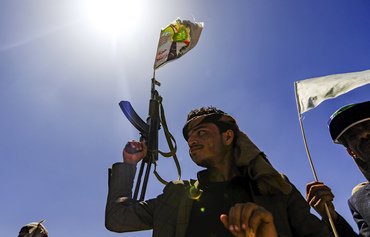Living conditions in Yemen have gone from bad to worse after three years of war pitting the Iran-backed Houthi (Ansarallah) militia against the legitimate government of Yemeni president Abd Rabbu Mansour Hadi.
Iranian intervention in Yemen through military, media and financial support for the Houthis is prolonging the war and exacerbating the suffering of Yemenis, political analysts tell Al-Mashareq.
UN aid operations chief John Ging on February 27th said living conditions in Yemen are "catastrophic" following three years of conflict.
Ging said Yemen, considered the world's worst humanitarian crisis, faces a growing risk of famine and cholera.
More than one million people have been infected with cholera since April 2017, the UN official noted, adding that diphtheria was on the rise for the first time since 1982.
On top of the public health crisis, more than 22 million people need food assistance, including 8.4 million who are on the verge of severe hunger, according to UN figures.
"People's lives have continued unraveling," Ging said. "Conflict has escalated since November driving an estimated 100,000 people from their homes."
Ging's comments came a day after Russia vetoed a British-drafted resolution that would have pressured Iran over the supply of missiles to the Houthis.
Yemenis reject Houthi rule
"The ongoing Iran-backed coup that enabled the Houthis to take over state institutions and take control of Yemeni provinces that are more densely populated than the liberated provinces, is prolonging the war," said political affairs researcher Waddah al-Jalil.
In the absence of state institutions, Houthi violations and illegal practices are rampant, amid continuing Iranian military, financial, media and other forms of support for the militia, he told Al-Mashareq.
The majority of Yemenis reject the rule of the Houthis, al-Jalil said.
The interest of the Yemeni people in getting rid of Houthi control intersects "with the interest of neighboring countries that want to protect their national security from Iranian missiles that are launched from Yemeni territory controlled by the Houthi militias", he said.
"Neighbouring countries will not allow these militias to remain [in power] if they continue to threaten their national security," he added.
Iranian support prolongs war
"As a result of Iran's continued support [of the Houthis], Yemenis are living in isolation from the regional and international community," al-Jalil said.
The continuation of the war is causing an absence of an economic and investment climate that would generate employment opportunities, he added.
Additionally, basic services are lacking, especially in the health and education sectors, which threatens the lives of future generations and helps plunge the country into more famine and poverty.
"The Iranian intervention is prolonging the war as it provides the Houthis with what they need to survive for a long time, namely arms and money, as well as media support," writer and political analyst Khalid Nasser told Al-Mashareq.
More than 22 million Yemenis live in poverty and half of them need urgent assistance, he said, while Iran continues to support the Houthis by smuggling arms to them.
'War is a disaster'
The suffering of Yemenis from the war is "the greatest humanitarian tragedy", economist Abdul Jalil Hassan told Al-Mashareq.
"War is a disaster that consumes everything," he said, noting that the poverty rate in Yemen has now exceeded 85% of the population.
The suspension of business activity has led to the layoff of thousands from their jobs, adding them to the impoverished segment, he said.
This is in conjunction with the collapse of the health and education systems and suspension of government services, Hassan added.
"All this has exacerbated the human suffering because of Iran's support for the Houthis, be it military support with missiles, or financial, media and political support," he said.

![Yemenis wait next to empty gas cylinders for gas supplies amid increasing shortages in the Yemeni capital Sanaa, on March 5th. [Mohammed Huwais/AFP]](/cnmi_am/images/2018/03/07/11734-Yemen-Sanaa-gas-600_384.jpg)







This article is full of lies and is untrue. Saudi Arabia and UAE have been occupying Yemen for three threes, and have been bombarding innocent civilians. This story about the so-called legitimacy is a lie.
Reply1 Comment(s)